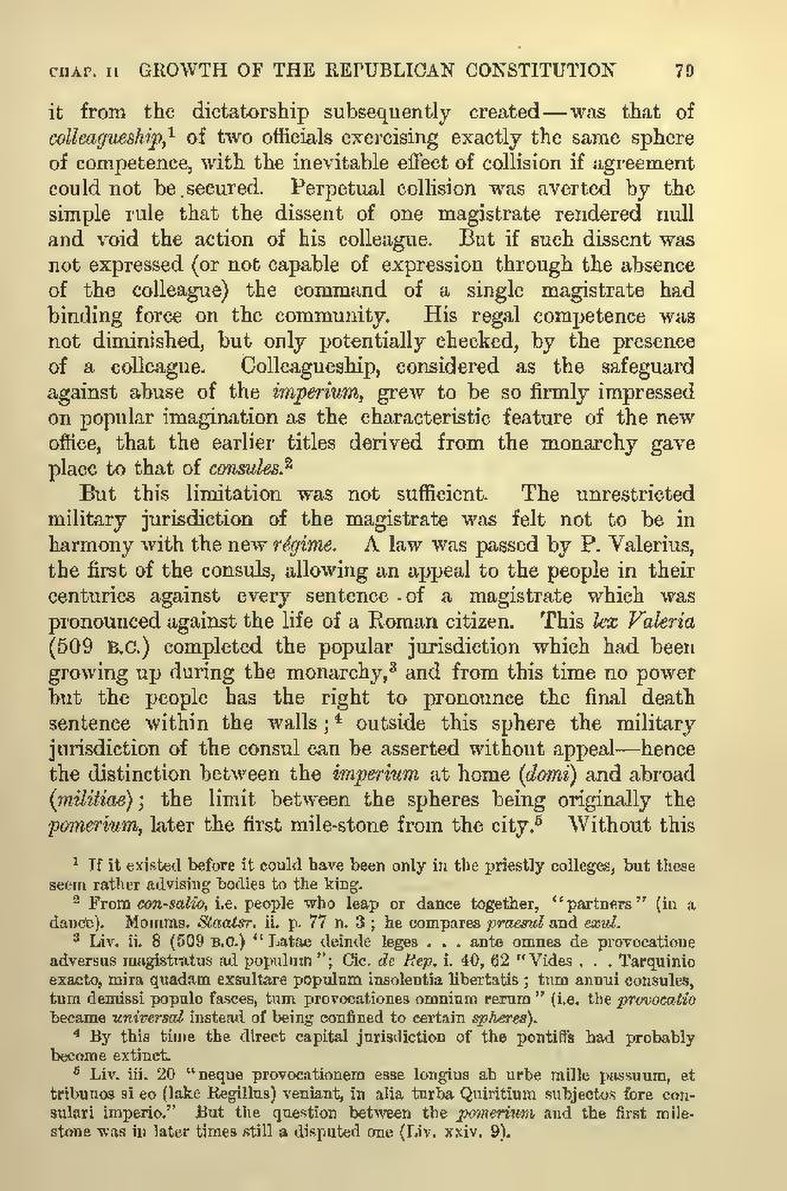it from the dictatorship subsequently created—was that of colleagueship,[1] of two officials exercising exactly the same sphere of competence, with the inevitable effect of collision if agreement could not be secured. Perpetual collision was averted by the simple rule that the dissent of one magistrate rendered null and void the action of his colleague. But if such dissent was not expressed (or not capable of expression through the absence of the colleague) the command of a single magistrate had binding force on the community. His regal competence was not diminished, but only potentially checked, by the presence of a colleague. Colleagueship, considered as the safeguard against abuse of the imperium, grew to be so firmly impressed on popular imagination as the characteristic feature of the new office, that the earlier titles derived from the monarchy gave place to that of consules.[2]
But this limitation was not sufficient. The unrestricted military jurisdiction of the magistrate was felt not to be in harmony with the new régime. A law was passed by P. Valerius, the first of the consuls, allowing an appeal to the people in their centuries against every sentence of a magistrate which was pronounced against the life of a Roman citizen. This lex Valeria (509 B.C.) completed the popular jurisdiction which had been growing up during the monarchy,[3] and from this time no power but the people has the right to pronounce the final death sentence within the walls;[4] outside this sphere the military jurisdiction of the consul can be asserted without appeal—hence the distinction between the imperium at home (domi) and abroad (militiae); the limit between the spheres being originally the pomerium, later the first mile-stone from the city.[5] Without this
- ↑ If it existed before it could have been only in the priestly colleges, but these seem rather advising bodies to the king.
- ↑ From con-salio, i.e. people who leap or dance together, "partners" (in a dance). Momms. Staatsr. ii. p. 77 n. 3; he compares praesul and exul.
- ↑ Liv. ii. 8 (509 B.C.) "Latae deinde leges . . . ante omnes de provocatione adversus magistratus ad populum"; Cic. de Rep. i. 40, 62 "Vides . . . Tarquinio exacto, mira quadam exsultare populum insolentia libertatis; tum annui consules, tum demissi populo fasces, tum provocationes omnium rerum" (i.e. the provocatio became universal instead of being confined to certain spheres).
- ↑ By this time the direct capital jurisdiction of the pontiffs had probably become extinct.
- ↑ Liv. iii. 20 "neque provocationem esse longius ab urbe mille passuum, et tribunos si eo (lake Regillus) veniant, in alia turba Quiritium subjectos fore consulari imperio." But the question between the pomerium and the first mile-stone was in later times still a disputed one (Liv. xxiv. 9).
